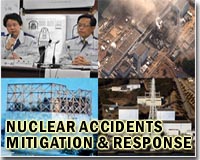| . |  |
. |
Vienna (AFP) March 18, 2011 The IAEA has come under fire over its response to the nuclear crisis in Japan, with critics saying it has been slow to act and provide accurate information about the unfolding catastrophe. But observers argue the fault lies more in the largely toothless mandate of what is frequently referred to as the UN's atomic "watchdog". Indeed, the International Atomic Energy Agency's statutes leave it wholly dependent on the voluntary compliance of member states to its safety standards. And the control of information similarly lies in the hands of the member states. As soon as it became clear that last week's devastating earthquake and tsunami had also crippled the Fukushima atomic power plant, 250 kilometres (155 miles) northeast of Tokyo, sparking fears of a nuclear catastrophe as big as Chernobyl, the IAEA was swamped with calls and enquiries from a worried international public. So much so that the Vienna-based agency's website, not designed to cope with so much traffic, has frequently collapsed, leaving IAEA officials to publish public notices on the social networking site Facebook as back-up. The IAEA's director general Yukiya Amano, himself a Japanese national, has in particular found himself in the firing line. While the first explosion at one of Fukushima's reactors occurred early last Saturday, a statement only appeared on the IAEA's website some six hours later. Updates over laste weekend were intermittent at best and it was not until Monday afternoon that Amano decided to appear before the press. Although the agency immediately offered its assistance to Japan when the disaster hit, it was not until Wednesday that Amano announced he would be sending a small team of experts to help. And Amano only decided to fly to Japan himself on Thursday to get a better idea of the extent of the devastation and discuss with the Japanese authorities "how best the IAEA can help" -- a full six days after the catastrophe hit. He was due to brief the watchdog's member states about this trip on Monday, in a special meeting of the 35-member board of governors in Vienna. In face of the crushing criticism, Amano and his top aides have repeatedly pointed out that the agency was doing all it could within the bounds of its -- arguably rather narrow -- mandate. Set up in 1957, the IAEA's main task is "to promote safe, secure and peaceful nuclear technologies", even if in recent years its main focus has been to investigate whether countries such as Iran are using outwardly peaceful nuclear activities as a cover for illicit atomic weapons programmes. But the IAEA, with its 151 member states, has no powers to legally enforce the safety standards it draws up for countries wishing to move into nuclear power. "The responsibility for safety is (one) for operators and states. The agency is not a state, so this is not our responsibility," was how Denis Flory, head of the IAEA's department for nuclear safety and security, summed it up. If the international community wanted a real "watchdog" that would be able to enforce and monitor adherence to legally binding safety requirements and report back to the public then it would be up to the member states to give it such powers, Amano said. The agency's diplomats are well aware of the dilemma. The IAEA is "not a regulatory body," said one diplomat, speaking on condition of anonymity. "Its role is limited. It simply cannot provide the sort of crisis management that people are currently wanting in Japan, because it is dependent on what information the Japanese authorities choose to give it." Amid the cacophony of expert opinions, the IAEA should have asserted its authority quickly and presented its own expert assessment, while not giving into speculation, diplomats said. Amano pointed out that it is the IAEA's duty to provide only information that it has been able to verify and authenticate, which could effectively mean a delay in publication. One of the reasons for his trip to Japan was expressly to improve communication between the Japanese side and the IAEA, Amano said. "I would like to see better communication and information both in quantity and quality. There's a constant flow of information, but certainly room for improvement. I would like to address this when I go to Japan." Fukushima's operator, TEPCO, has also come under fire, but Amano was reluctant to point the finger just yet, saying a full evaluation of what went wrong at Fukushima and who was to blame would have to wait until the current crisis had been resolved.
Share This Article With Planet Earth
Related Links Bringing Order To A World Of Disasters A world of storm and tempest When the Earth Quakes
 Japan battles nuclear crisis as foreigners flee
Japan battles nuclear crisis as foreigners fleeTokyo (AFP) March 18, 2011 Teams of Japanese workers and troops Friday battled to prevent meltdown at a quake-hit nuclear plant as alarm over the disaster grew with more foreign governments advising their citizens to flee. At the stricken Fukushima No. 1 plant, 250 kilometres (155 miles) from Tokyo, Chinook military helicopters have dumped tonnes of water in a desperate bid to cool reactors crippled by the earthquake ... read more |
|
| The content herein, unless otherwise known to be public domain, are Copyright 1995-2010 - SpaceDaily. AFP and UPI Wire Stories are copyright Agence France-Presse and United Press International. ESA Portal Reports are copyright European Space Agency. All NASA sourced material is public domain. Additional copyrights may apply in whole or part to other bona fide parties. Advertising does not imply endorsement,agreement or approval of any opinions, statements or information provided by SpaceDaily on any Web page published or hosted by SpaceDaily. Privacy Statement |